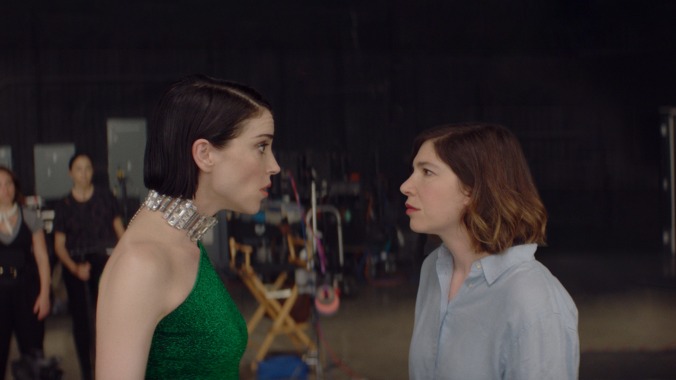Carrie Brownstein and St. Vincent make The Nowhere Inn a fun place to visit, but probably just once
This strange mockumentary uses the musicians’ real-life personas as fodder for cringe comedy and Lynchian pathos


Did you know that the pressures of fame can lead to an identity crisis? Let’s go ahead and assume you do. Certainly, if you’ve seen any of the hundreds of films and television shows that deal with this question, you’re already familiar with the kinds of narratives Annie Clark (a.k.a. musical phenom St. Vincent) and Carrie Brownstein (of Sleater-Kinney and Portlandia fame) are lampooning with their new feature-length curiosity, The Nowhere Inn. An odd hybrid of mockumentary and indie head-trip, the film delights in satirizing the conventions of tour documentaries, while simultaneously attempting to integrate elements of psychological horror and art-house provocation with straight-faced seriousness. Never consistently funny enough to work as straight comedy and too broad to succeed in its somber aspirations, the results are still engaging in their attempts to defy easy categorization. Like St. Vincent herself, The Nowhere Inn keeps morphing into something else.
The premise is as simple as Spinal Tap: a tour documentary gone horribly awry. Clark and Brownstein play stylized versions of themselves as a pair of longtime best friends whose relationship gets uncomfortable after the former asks the latter to film a documentary going behind the scenes of her Masseduction tour. After a little time on the road together where not much happens—as Clark succinctly puts it, “tour is boring,” save for the 90 minutes on stage each night—Brownstein realizes a movie about her friend playing video games, exercising, and visiting farmer’s markets may not be all that compelling. (As she says to the musician in a moment of uncomfortable honesty, “Your life isn’t crazy or interesting enough to make a documentary about.”) In hopes of getting better material, Brownstein suggests that Clark try to liven things up by incorporating some of her dramatic onstage persona into her humdrum, everyday routine—to bring a little rock-star excitement to her normal life.
From such humble beginnings are ace comic situations born, and for the first 30 minutes or so, it seems as though the pair will blunder their way through an increasingly absurd series of cringe-comedy exchanges, with Clark dismally failing to follow Brownstein’s well-intentioned but oft-unkind directions. These scenes, some of which play like Portlandia sketches, vary in quality, though all share an agreeably brisk comic pacing (and a fairly broad tone—at one point, the starved-for-ideas Brownstein is shown Googling “best documentaries”). There’s an especially Curb Your Enthusiasm-like sequence where an interviewer pressures Clark into telling her girlfriend, via voicemail, that “no one will ever love you like she will.” Both performers acquit themselves well enough, though the quality of the acting tends to rise and fall based on how much emotional heavy lifting is required.
Slowly, the “St. Vincent” persona starts to override Clark the person, as the artist’s narcissism and frustration transform her into the kind of vainglorious egoist who will sacrifice everything, including her best friend, in the name of creating better art. (Fans of either musician can read a lot into this film, first and foremost how Clark seems to be playfully riffing on her own reputation for being “difficult.”) There are some humorous elements drawn from this; the comic zenith (or nadir, from Brownstein’s perspective) is arguably when Clark forces the deeply uncomfortable documentarian to film her having sex with girlfriend Dakota Johnson, also playing a version of herself. But this is also where The Nowhere Inn segues into hallucinatory surrealism. Director Bill Benz, making his feature-length debut after years of honing his TV sketch-comedy chops on programs like Kroll Show (and, yes, Portlandia), has fun experimenting with different grains and film formats as the narrative wanders through flashbacks, screens within screens, nightmares, and more.
As with the movie’s comedy, there’s a range of effectiveness to these scenes. Increasingly, moments resemble homages to Nicolas Winding Refn and David Lynch—especially the latter, thanks not only to the themes (loss of identity and darkness hiding beneath the glitz of a starry facade) but also to two separate moments that explicitly mimic the “Club Silencio” sequence from Mulholland Drive. As “St. Vincent” takes over and Brownstein loses herself, the film descends into a visually appealing but not terribly inventive meditation on the impossibility of knowing one’s self, best embodied by the bluntly effective (if somewhat trite) shot of Clark pulling back stage curtains over and over as she tries to catch a version of herself continually just out of reach. By the time The Nowhere Inn indulges in not one but several Twilight Zone endings, you may find yourself wishing this fun but slight endeavor had a little more of the force and daring so present in the music made by its stars.